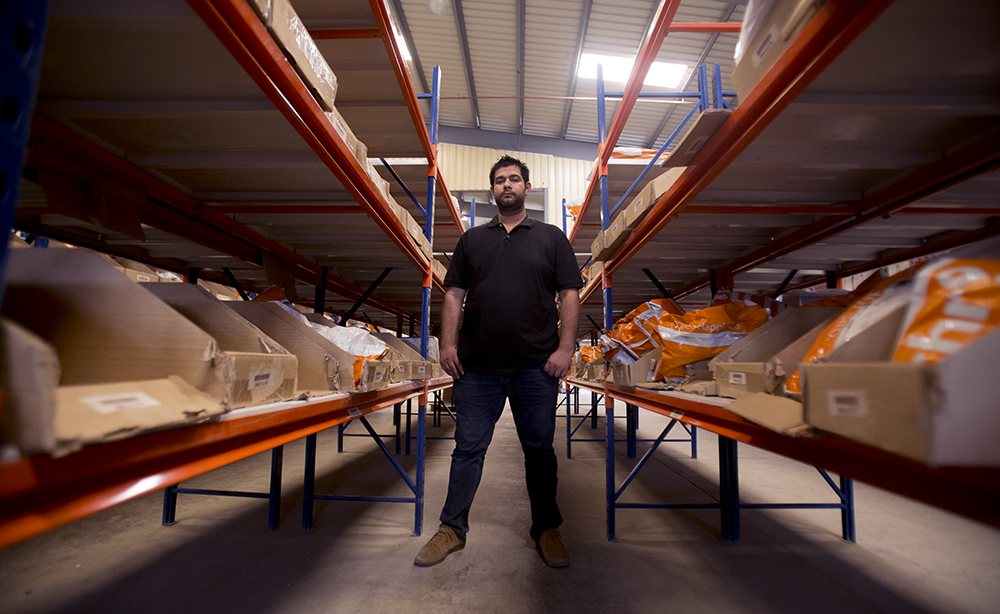How This Egyptian Entrepreneur is Putting Courier Data In Order
Mediating between merchants and courier companies, VOO’s CEO Waleed Rashed walks Senior Writer Leena ElDeeb through the delivery industry as he attempts to fill in a missing gap.

In a big warehouse in 6thof October City’s Industrial Area, Waleed Rashed sits on one of the wooden stands on which packages wait to be shipped to their new homes. “I’ve spent the past seven years in the courier industry,” he tells Startup Scene. In late 2012, Rashed had started a company called Ingez and sold his shares on July 2017.
“Starting a business seems easy at first,” he reflects. “People think, 'let’s get a group of people together to deliver a few products we would sell on a Facebook page.' However, as your business grows and the orders increase, you are faced with endless problems every day.” Rashed believes that even though there is a huge niche to take advantage of in e-commerce, there is still a large gap between the supply and demand.
During his entanglement with different wires of the courier industry, he often saw people asking to deliver or sell things online, who would always have a problem when it came to looking for the right company; one capable of providing all the services.
Almost all the problems would revolve around the issue of not having all the information at hand. “They would always have questions regarding certain services and whether they were provided, such as cash collection and returning orders,” Rashed continues. “People also wonder about the range of locations, or whether the company has the required technology to follow through - and more importantly, whether the company is able to aid its customers in all aspects.”

“Starting a business seems easy at first," says Waleed Rashed, VOO's CEO.
Eight months ago, Rashed started thinking about VOO as a digital solution to the problems he and others in the industry faced. Inspired by the sound children make when driving their toy vehicles, implying speed, he decided to call the startup VOO; a platform that acts as a mediator between courier companies and merchants. “After Ingez, we are no longer the deliverymen; we deliver through partners like Fetchr, Aramex, and TNT.”
The software engineers behind VOO are now the ones responsible for patrolling the deliveries, and making the experience above satisfactory for both ends of the transaction between the seller and buyer. The procedure is simple: merchants or businesses which want to send their orders head to VOO’s website and generate the startup’s API integration, through which they can automatically cypher which company can deliver the fastest and more effectively to the requested location, be it from Cairo or Alexandria.
The majority of clients are missing on a database of information, tips, and pointers to help maximise benefits and comfort. “VOO ties both ends of the supply and demand exchange,” Rashed says. “The biggest issue we face is that we need courier companies to stay up-to-date when it comes to technology so that this venture can flourish.”
Using tech solutions, their most prominent feature is providing as much data as possible regarding delivery and its process, with tracking options. “Most people struggle with the fact that they are unable to track their products, or it just ends up disappearing,” he says. “We wanted to help make the experience easier to monitor with less room for mishaps.” Following up on the order, VOO replaces the courier company to help people with issues those companies cannot handle, and intervene to resolve the complications.

“We want to inform the public more about the market."
The e-commerce market is ever-evolving and growing, and this is where the significance of startups like VOO prevails. “We intend on providing some order in this hectic industry, and make everything clear. We include information such as statistics, locations, popular purchases, and tracking options.”
Rashed realises that the services VOO advertises are not just important to the merchants, but also for the courier companies. “Courier companies always have multiple things going on. There is a constant need to invest more in their warehouses or number of couriers. Through the sales, marketing, and business development, we help aid them and improve their services,” he says; this also includes investigating whether they need to work on their social media channels or branding.
“We want to increase the programmes, train more employees and set up a more effective operation systems.” To finance these ambitions, VOO is currently running its second round of seed investment and is already in talks with regional investors. Last October, they got pre-seed funding from a group of investors from Alex Angels.
“VOO has a busy year ahead with a lot of upcoming tasks,” the CEO says; walking Startup Scene’s crew through both his plans and his client’s warehouse. “We want to inform the public more about the market. What are the products in high demand? What are the most popular recipient locations? What information does the company require to deliver the product quickly? They need to know things like what stops a fragile package from breaking.”
Thus, VOO is expanding its boulevard of services and will release a set of quarterly reports sharing insights as to what courier companies need to deliver products faster. “We intend to publish multiple reports discussing the required environment to deliver a product effectively,” he says; adding that their solitary goal is efficient and fast delivery of goods.
VOO has just inked two contracts with two international courier companies; by that they expect that by the end of the year they would be able to stretch their scope across the world.
Photography and videography by @MO4Network's #MO4Productions.
Photographer: Eslam Mohamed.
Videographer: Mohamed Osama.




















